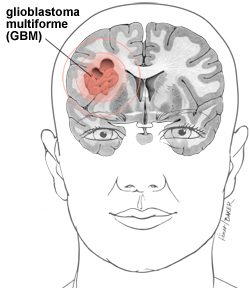- Home
- Editorial
- News
- Practice Guidelines
- Anesthesiology Guidelines
- Cancer Guidelines
- Cardiac Sciences Guidelines
- Critical Care Guidelines
- Dentistry Guidelines
- Dermatology Guidelines
- Diabetes and Endo Guidelines
- Diagnostics Guidelines
- ENT Guidelines
- Featured Practice Guidelines
- Gastroenterology Guidelines
- Geriatrics Guidelines
- Medicine Guidelines
- Nephrology Guidelines
- Neurosciences Guidelines
- Obs and Gynae Guidelines
- Ophthalmology Guidelines
- Orthopaedics Guidelines
- Paediatrics Guidelines
- Psychiatry Guidelines
- Pulmonology Guidelines
- Radiology Guidelines
- Surgery Guidelines
- Urology Guidelines
New treatment for Glioblastoma multiforme

The National Foundation for Cancer Research (NFCR) congratulated Dr. Web Cavenee and Dr. Paul B. Fisher on their discovery of a new pharmacological agent to treat glioblastoma multiforme (GBM), the deadliest brain cancer, which they have been developing together with NFCR support.
This new pharmacological agent could with additional chemistry lead to a new drug to prevent radiation-induced invasion of GBM cells. The researchers have tested their pharmacological agent in combination with radiation with profound survival benefits in pre-clinical models.
Paul B. Fisher, M.Ph., Ph.D., Director of the Virginia Commonwealth University's (VCU) Institute of Molecular Medicine (VIMM), focuses on cancer genetics and Web Cavenee Ph.D., Director of the Ludwig Institute for Cancer Research at the University of California at San Diego focuses on GBM. An exciting breakthrough for the treatment of GBM, this is about collaboration between two scientists on opposite coasts and shows how NFCR research may lead to tangible therapies for multiple cancers.
NFCR has been funding Dr. Fisher's research since 2008, and Dr. Cavenee's research starting in 2002. "NFCR scientists are making headway in the fight against one of the most aggressive form of cancer, GBM, by working together on vital pre-clinical models," said Franklin C. Salisbury, Jr., NFCR CEO. "For years, discoveries from NFCR-funded research have led to better treatments and this latest discovery by two incredibly talented scientists gives us proof there will be improved therapies for GBM and multiple cancers in the foreseeable future."

Disclaimer: This site is primarily intended for healthcare professionals. Any content/information on this website does not replace the advice of medical and/or health professionals and should not be construed as medical/diagnostic advice/endorsement or prescription. Use of this site is subject to our terms of use, privacy policy, advertisement policy. © 2020 Minerva Medical Treatment Pvt Ltd